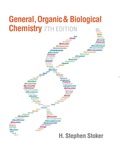
(a)
Interpretation:
The species
Concept Introduction:
Radiations emitted from a radionuclide are very harmful at higher levels. Radiations cannot be heard, tasted, seen, or even felt. Radiation can be detected by making use of the fact that the radiation ionizes molecules and atoms. Radiations are classified as ionizing radiation and non-ionizing radiations. When an ionizing radiation hits an atom or molecule ion pairs are formed. Free radicals are also formed along with the ion pairs.
Free radicals can be identified by drawing Lewis structures. In the Lewis structure if there is an unpaired electron present then it is a free radical.
(b)
Interpretation:
The species
Concept Introduction:
Radiations emitted from a radionuclide are very harmful at higher levels. Radiations cannot be heard, tasted, seen, or even felt. Radiation can be detected by making use of the fact that the radiation ionizes molecules and atoms. Radiations are classified as ionizing radiation and non-ionizing radiations. When an ionizing radiation hits an atom or molecule ion pairs are formed. Free radicals are also formed along with the ion pairs.
Free radicals can be identified by drawing Lewis structures. In the Lewis structure if there is an unpaired electron present then it is a free radical.
(c)
Interpretation:
The species
Concept Introduction:
Radiations emitted from a radionuclide are very harmful at higher levels. Radiations cannot be heard, tasted, seen, or even felt. Radiation can be detected by making use of the fact that the radiation ionizes molecules and atoms. Radiations are classified as ionizing radiation and non-ionizing radiations. When an ionizing radiation hits an atom or molecule ion pairs are formed. Free radicals are also formed along with the ion pairs.
Free radicals can be identified by drawing Lewis structures. In the Lewis structure if there is an unpaired electron present then it is a free radical.
(d)
Interpretation:
The species
Concept Introduction:
Radiations emitted from a radionuclide are very harmful at higher levels. Radiations cannot be heard, tasted, seen, or even felt. Radiation can be detected by making use of the fact that the radiation ionizes molecules and atoms. Radiations are classified as ionizing radiation and non-ionizing radiations. When an ionizing radiation hits an atom or molecule ion pairs are formed. Free radicals are also formed along with the ion pairs.
Free radicals can be identified by drawing Lewis structures. In the Lewis structure if there is an unpaired electron present then it is a free radical.
Want to see the full answer?
Check out a sample textbook solution
Chapter 11 Solutions
EBK GENERAL, ORGANIC, AND BIOLOGICAL CH
- Sketch and label the various parts of transition state diagrams for a reaction with and without a catalyst. Compare A G and A G+ for each case.arrow_forwardDefine the following terms:a. allyl groupb. epoxidec. SAM d. PAPSe. phase I reactionarrow_forwardWhich of the following best describes this reaction ? Choose one: O A. redox O B. condensation C. hydrolysisarrow_forward
- Modify the structure to show the MAJOR product that would be formed in the following reaction. HNO3, H2SO4arrow_forwardA B CH₂OH H H OH E Which carbon is the anomeric carbon in the structure shown here? OH H OH CH₂OH Question 15 of 25 D A) A B) B C) C D) D E) E Submitarrow_forwardPredict the product of the following organic reaction: CH₂ CH Ni + 3 H₂ P CH2 Specifically, in the drawing area below, draw the chemical structure of the product P. If there is no product, because this reaction won't happen, check the No reaction box under the drawing area. Click and drag to start drawing a structure.arrow_forward
- Consider a transition of X → y. assume that the only difference between X and y is the presence of three hydrogen bonds in y that are absent in X. What is the ratio of X to y when the reaction is in equilibrium?arrow_forwardA (-) charge in the transition state can be stabilized by a catalyst, which is usually a(n): a. Anion b. Base Oc. Nucleophile Od. Acidarrow_forwardIdentify ALL the CORRECT statements regarding the compound shown below. SELECT ALL THAT APPLY A. The compound is a heterocycle B. The compound is found in DNA C. The compound is a pentose sugar D. The compound is a purinearrow_forward
- What is the major organic product obtained from the following sequence of reactions? 4 1 2 3 2. H3O+ يديا 2 3 NH2arrow_forwardPredict the product(s) of the following reaction. H H NaOH, EtOH heat HO E + Z isomers A E + Z isomers E + Z isomers E + Z isomers B C Darrow_forwardWhich of the following compounds would be most soluble in carbon tetrachloride, CCl4? a. NH3 d. CH3OHb. H2O e. C6H6c. HClarrow_forward
 Human Anatomy & Physiology (11th Edition)BiologyISBN:9780134580999Author:Elaine N. Marieb, Katja N. HoehnPublisher:PEARSON
Human Anatomy & Physiology (11th Edition)BiologyISBN:9780134580999Author:Elaine N. Marieb, Katja N. HoehnPublisher:PEARSON Biology 2eBiologyISBN:9781947172517Author:Matthew Douglas, Jung Choi, Mary Ann ClarkPublisher:OpenStax
Biology 2eBiologyISBN:9781947172517Author:Matthew Douglas, Jung Choi, Mary Ann ClarkPublisher:OpenStax Anatomy & PhysiologyBiologyISBN:9781259398629Author:McKinley, Michael P., O'loughlin, Valerie Dean, Bidle, Theresa StouterPublisher:Mcgraw Hill Education,
Anatomy & PhysiologyBiologyISBN:9781259398629Author:McKinley, Michael P., O'loughlin, Valerie Dean, Bidle, Theresa StouterPublisher:Mcgraw Hill Education, Molecular Biology of the Cell (Sixth Edition)BiologyISBN:9780815344322Author:Bruce Alberts, Alexander D. Johnson, Julian Lewis, David Morgan, Martin Raff, Keith Roberts, Peter WalterPublisher:W. W. Norton & Company
Molecular Biology of the Cell (Sixth Edition)BiologyISBN:9780815344322Author:Bruce Alberts, Alexander D. Johnson, Julian Lewis, David Morgan, Martin Raff, Keith Roberts, Peter WalterPublisher:W. W. Norton & Company Laboratory Manual For Human Anatomy & PhysiologyBiologyISBN:9781260159363Author:Martin, Terry R., Prentice-craver, CynthiaPublisher:McGraw-Hill Publishing Co.
Laboratory Manual For Human Anatomy & PhysiologyBiologyISBN:9781260159363Author:Martin, Terry R., Prentice-craver, CynthiaPublisher:McGraw-Hill Publishing Co. Inquiry Into Life (16th Edition)BiologyISBN:9781260231700Author:Sylvia S. Mader, Michael WindelspechtPublisher:McGraw Hill Education
Inquiry Into Life (16th Edition)BiologyISBN:9781260231700Author:Sylvia S. Mader, Michael WindelspechtPublisher:McGraw Hill Education





